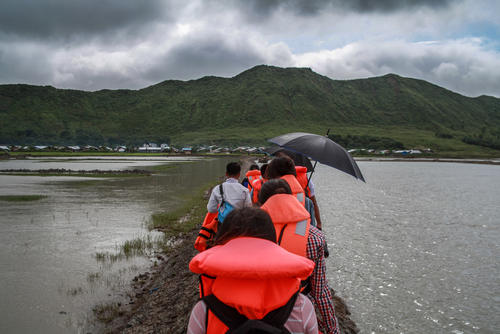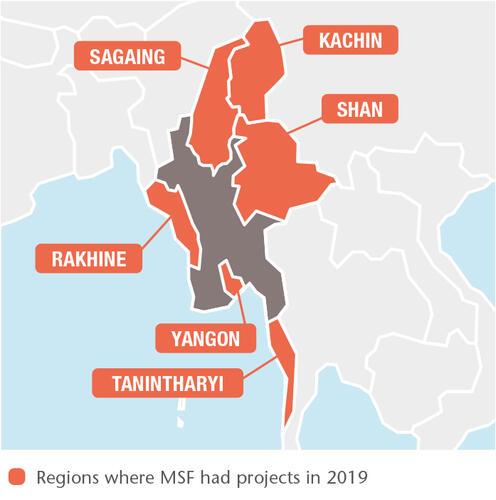
41,000
41,
15,100
15,1
430
43

1,540
1,54
In 2019, we ran projects across the country, addressing gaps in healthcare in hard-to-reach communities and responding to the immense needs of people affected by interethnic tensions and displacement.
Conflict and displacement
More than 50,000 people were displaced in 2019 and several civilians died, including children, as a result of the continuous fighting between the Myanmar army and the ethnic Rakhine-backed Arakan army in Rakhine state. After several months of deadlock due to the authorities’ refusal to grant access to international humanitarian organisations, MSF was able to resume activities to assist the displaced, first in Buthidaung, in June, and then in Maungdaw in November. As well as running mobile clinics and conducting health education and psychosocial support sessions, our teams distributed relief items, such as mosquito nets, blankets and soap, and constructed shelters and sanitation systems.
We continued to work in displacement camps in Pauktaw township, central Rakhine, where thousands of Rohingya and other ethnic minorities such as Kaman, remain confined as a result of previous outbreaks of violence. We deployed seven mobile clinics offering general healthcare and emergency referrals around these settlements and in nearby villages, as well as in Aung Mingalar, a closed Muslim ghetto in Sittwe, where we also run a mental health programme.
MSF also opened two new project sub-sites in Kachin and Shan, neighbouring states in the north where there are large numbers of migrants, displaced people and groups vulnerable to HIV infection, such as drug users and sex workers. Our services include general healthcare and treatment for sexual and gender-based violence, HIV, hepatitis C and tuberculosis (TB).
HIV and hepatitis C
We are working closely with the Ministry of Health to transfer our HIV patients – including those co-infected with hepatitis C, TB and multidrug-resistant TB (MDR-TB) – to the decentralised national AIDS programme so they can receive care closer to home. A total of 8,012 patients from our projects in Kachin, Shan, and Yangon were transferred. In June, we closed Insein clinic in Yangon after a successful transition.
In Dawei, a port city in Tanintharyi, where many fishermen and migrants live, MSF offers comprehensive HIV care, treatment and prevention for people at risk.
In 2019, we also started working in partnership with Médecins du Monde to treat HIV patients co-infected with hepatitis C treatment in Kachin. Our team offers technical support, follow-up and data management.
Healthcare in remote communities
Our mobile teams provide general healthcare to rural communities in Naga (Sagaing), a remote, impoverished region with few health facilities. Our staff conducted 3,250 outpatient consultations in villages in 2019, travelling by motorcycle across steep terrain to reach the 15 communities we have targeted. We are working there to strengthen the role of community health workers, promote health education and support the Ministry of Health with simpler, more accurate diagnosis of TB and MDR-TB.

















